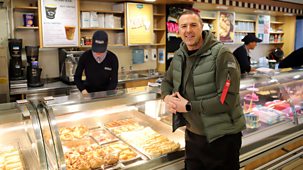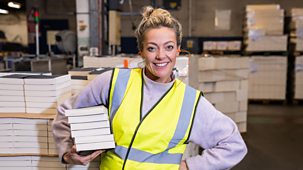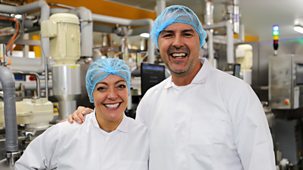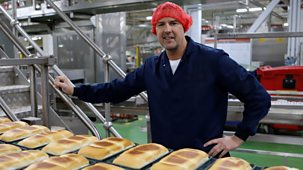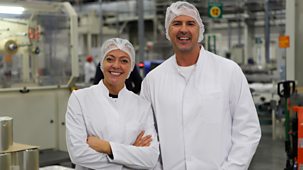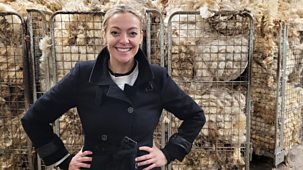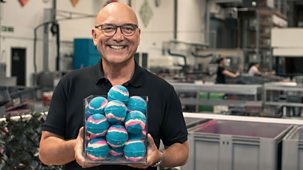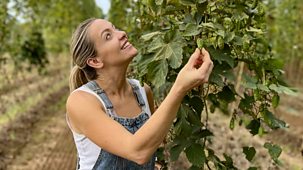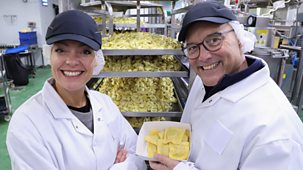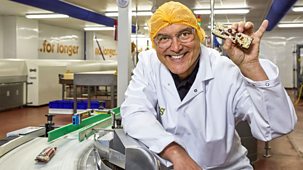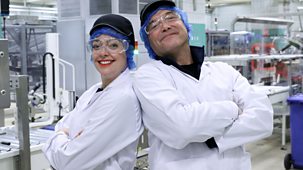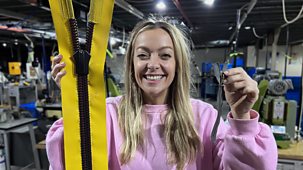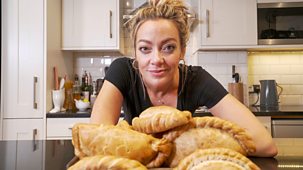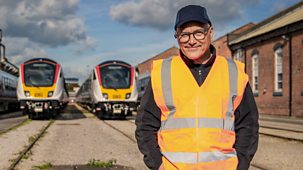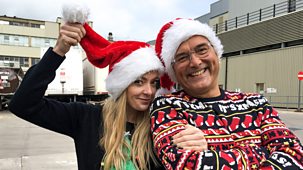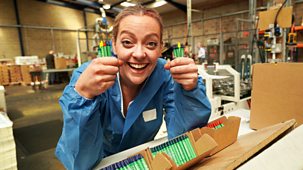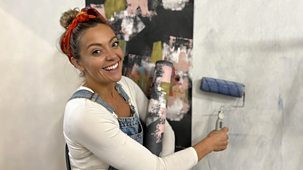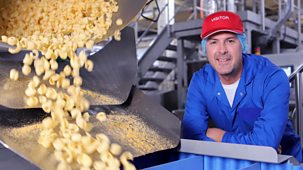
Series 9: 3. Cheese Curls
In this episode, Paddy McGuinness explores the secrets of the Walkers factory in Lincoln, to reveal how it makes 500 million packs of Quavers every year. \n\nPaddy begins by meeting factory manager Layla Whiting, who reveals that, despite popular belief, cheese curls aren’t officially classed as crisps! In fact, while crisps are made from sliced potatoes, Quavers are made from the potato starch powder left behind during the crisp-making process. Their first stop is a huge mixer where the starch powder is added, along with equally fine rice and soya flours. Then they add some mild seasoning of salt, pepper, onion powder and yeast - but no cheese flavour yet. The whole lot is mixed with water to create a dough. \n\nThis is a huge and very hot factory! Comparing it to getting off a plane on holiday, Paddy exclaims, ‘this is like landing on the sun!’ But he soldiers on to the next stage of production. After mixing, the dough is forced under very high pressure through an extruder, emerging as a continuous one-millimetre-thick sheet. It looks more like a lasagne sheet at this stage and the process is nothing like Paddy imagined it would be. \n\nTo ensure every one of the snacks ends up with the famous curly shape, the dough is stretched over rollers to add tension. Then it travels through an 18-metre-long steamer, increasing the moisture level in the dough to 40%, making it more pliable and stretchy. After being quickly cooled, the continuous sheet of dough is sent rushing through a machine which chops it into 13 millimetre by 40 millimetre pellets, at a rate of 7,900 a minute. But the pellets contain too much moisture, so they are sent through a series of dryers, bringing the moisture content down to 11%. \n\nOver in the frying area, Paddy learns how 1.2 tonnes of pellets travel through a specialist fryer every hour. Inside the fryer, the pellets are plunged into sunflower oil heated to 200 degrees Celsius. The heat of the oil causes any remaining water inside to turn to steam, puffing them and leaving tiny air holes. At the same time, the tension created when the dough was stretched now contracts and curls up. After 20 seconds in the oil, 1.8 million perfectly formed curls cascade out of the fryer every hour. Finally, Paddy is able to see the curly snack he knows. There is one vital thing missing from the snacks though – cheese flavouring. To put that right, each one of the freshly cooked curls travels through a huge metal drum where a precise amount of cheese powder flavouring is applied. \n\nAfter a welcome taste test, Paddy follows his snacks, still warm off the production line, to the packing department. First, a specialist machine called a multi-head weigher carefully portions out 16 grams of cheese curls before another machine seals them neatly into aluminium and plastic packets. Then, each packet is sent hurtling towards a robot which sorts them into groups of six, before they are packed into multipack bags. \n\nFinally, the multipacks are put into boxes and placed on pallets before making their way to the dispatch area. There, Paddy learns how 93,600 packets are loaded onto each waiting lorry, before being sent to shops and supermarkets across the country. \n\nEarlier in the episode, Cherry visits a Walkers crisp factory to learn how the starch from potato crisp production is transformed into the potato starch powder used to make the cheese curls. And she visits another factory in Leicester to find out how ten million bags of Bombay Mix are produced every year. \n\nMeanwhile, historian Ruth Goodman learns how a group of American military scientists invented cheese flavouring during the Second World War.
Source: BBC 2
Most recent episodes of Inside the Factory
Inside The Factory
Series 9: 6. Sausage Rolls
Paddy McGuinness explores the secrets of the McColgan’s bakery in Strabane, Northern Ireland, to reveal how it makes more than half a million sausage rolls a day. \n\nAft ...
09-02-2025
BBC 2
Inside The Factory
Series 9: 5. Hardback Books
Paddy McGuinness visits the Clays book factory in Suffolk to learn how they produce 20,000 copies of Pride and Prejudice for publisher Penguin. The factory makes an astonishing ...
02-02-2025
BBC 2
Inside The Factory
Series 9: 4. Flapjacks
In this episode, Paddy McGuinness explores the secrets of the Graze factory in west London, revealing how they make 40 million flapjacks a year. \n\nArmed with a trusty tasting ...
26-01-2025
BBC 2
Inside The Factory
Series 9: 3. Cheese Curls
In this episode, Paddy McGuinness explores the secrets of the Walkers factory in Lincoln, to reveal how it makes 500 million packs of Quavers every year. \n\nPaddy begins by mee ...
19-01-2025
BBC 2
Inside The Factory
Series 9: 2. Sliced Bread
In a nostalgic episode of Inside the Factory, new presenter Paddy McGuinness visits the Warburtons bread factory in his hometown of Bolton, where he once worked as a youngster m ...
12-01-2025
BBC 2
Inside The Factory
Series 9: 1. Chocolate Seashells
Paddy McGuinness is fully immersing himself in the festive spirit as he explores a huge chocolate factory in Belgium. With lots of taste tests to enjoy along the way, he embrace ...
28-12-2024
BBC 2
Inside The Factory
Series 8: 7. Carpets
Gregg Wallace explores the Axminster factory in Devon to reveal how it produces 46,000 square metres of carpet every year. He follows the production of one of their best sellers ...
15-11-2024
BBC 2
Inside The Factory
Series 8: 6. Bath Bombs
Gregg Wallace visits the colourful and fragrant Lush factory in Dorset to learn how an astonishing 14 million bath bombs are produced every year.\n\nCherry Healey visits Loughbo ...
09-10-2024
BBC 2
Inside The Factory
Series 8: 5. Stout
Gregg Wallace explores the secrets of the Guinness brewery in Dublin to reveal how it makes two million litres of Irish stout every single day.\n\nCherry Healey visits a water t ...
02-10-2024
BBC 2
Inside The Factory
Series 8: 4. Stuffed Pasta
Gregg Wallace explores the Dell Ugo factory in Hertfordshire to reveal how it makes 500 million stuffed pasta parcels every year. \n\nHe’s following production of one of ...
25-09-2024
BBC 2
Most popular episodes of Inside the Factory
Inside The Factory
Series 9: 5. Hardback Books
Paddy McGuinness visits the Clays book factory in Suffolk to learn how they produce 20,000 copies of Pride and Prejudice for publisher Penguin. The factory makes an astonishing ...
02-02-2025
BBC 2
Inside The Factory
Series 5: 10. Cereal Bars
Gregg Wallace is in Essex at an enormous cereal bar factory, which produces 400,000 fruit- and nut-packed treats a day. Gregg follows production from the arrival of two tonnes o ...
01-10-2023
BBC 2
Inside The Factory
Series 8: 3. Jeans
Gregg Wallace visits two factories in Italy and Wales to explore the fascinating secrets behind how Welsh jeans brand Hiut make their trousers, learning how denim cloth is made ...
12-09-2024
BBC 2
Inside The Factory
Series 5: 6. Pasties
Gregg Wallace is in Cornwall at an enormous bakery where they produce 180,000 Cornish pasties a day. He follows the production of the pastry snacks from the arrival of two tonne ...
04-06-2023
BBC 2
Inside The Factory
Series 7: Trains
When he was a child, Gregg loved playing with toy trainsets. Now he’s got special access to learn how the ultimate model is made: a huge 187-tonne, five-carriage electric ...
29-08-2024
BBC 2
Inside The Factory
Christmas 2018
Chocolates are an essential part of many people's festive celebrations. In this Christmas special, Gregg Wallace visits a factory which produces a staggering two million tins of ...
24-12-2023
BBC 2
Inside The Factory
Series 4: 9. Pencils
Gregg Wallace is in Germany, at a historic factory which produces 600,000 pencils a day. At materials intake he is astonished that the main material in a pencil is not lead, but ...
16-04-2019
BBC 2
Inside The Factory
Series 8: 10. Paint And Wallpaper
Gregg Wallace explores the Farrow & Ball factory in Dorset to learn how they produce up to 200,000 litres of paint and 10,000 metres of wallpaper a week. They make 270 different ...
15-03-2024
BBC 2


